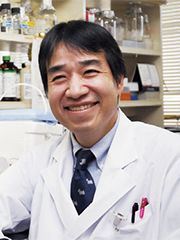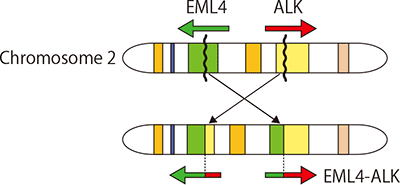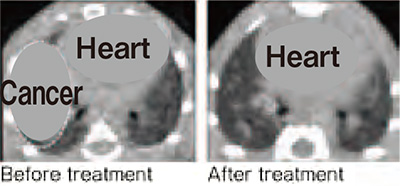Research Results
Targeting just the cancer cells!
Realization Through Molecular Target Therapy FY2016

- Hiroyuki Mano (Professor, Graduate school of medicine and facility of medicine, The University of Tokyo)
- CREST
- Basic Technology to Establishing Tailor-Made Medicine by Utilizing Genome Information "Characterization Human Disorders with a High-throughput Analysis of the Regulatory Mechanism for Gene Expression" Research Director (2002-2008)
- Research Acceleration
- "Novel cancer gene identification project" Research Director (2009-2014)
Research toward a long-held dream: an oral drug to cure cancer
Until around 40 years ago, the cancer overwhelmingly typical of the Japanese was stomach cancer. However, as times have changed, the incidence of lung cancer has risen dramatically, such that in 2009 lung cancer was the leading cause of cancer death among both men and women. The idea of an oral drug that might cure lung cancer sounds like a dream; however, recently announced research results seem likely to fulfill this dream. This research has gained worldwide attention as an indicator of new possibilities; not only for lung cancer, but across the entire spectrum of cancer treatments.
In order to discover cancer genes, Professor Hiroyuki Mano et al. developed a new screening method. At CREST in 2007, Professor Mano discovered the EML4-ALK fusion gene; at Research Acceleration in 2012, he discovered the RET and ROSI fusion genes, which are all responsible for causing lung cancer. Moreover, he discovered RAC point mutation genes in 2013. These genes indicate possibility of causing breast cancer, melanoma, pancreas cancer, etc. Simply put, by taking medication that suppresses the activation of these genes, we can now eliminate cancer caused by EML4-ALK. Actually, it has been confirmed that ALK fusion gene inhibitors are surprisingly effective in treating lung cancer possessing the EML4-ALK gene; in August 2011, an ALK fusion gene inhibitor was approved in the USA as oral medication for EML4- ALK-positive lung cancer. This was the world's fastest ever development of an anti-cancer agent, taking a mere 4 years from discovery of the therapeutic target to approval of medication. It was also approved for manufacture and sale in Japan in March 2012, with sales of the medication commencing in May of that year. At present, it is used for more than 12,000 people across the world, and at least 2,500 people in Japan alone. Furthermore, ALK inhibitor Alectinib, which was developed domestically and approved for manufacture and sale in July 2014, proved to have incredible treatment effect with an efficiency of 93.5%. Close to 900 people in Japan have already been treated. It is expected to contribute further to the treatment for EML4-ALK-positive lung cancer in the future.
Genetic breakdowns give rise to cancer
Our cells, of which we are said to possess around 60 trillion, are controlled by more than 200,000 genes. This genetic control functions as precisely as a computer; however, in extremely rare cases, a gene breaks down and an abnormal signal is sent in error. This genetic breakdown causes the occurrence of cancer cells. Genes break down for a wide range of reasons, including viruses, exposure to chemical substances, and errors during gene replication. In the case of the EML4-ALK fusion gene, this error results from part of the EML4 gene being switched with part of the ALK gene during the process of gene replication.

As a result of chromosome recombination, the genes EML4 and ALK combine to form the EML4-ALK fusion gene, which causes cancer.
Are more potent genes actually easier to overcome?
When most people think about cancer treatments, they imagine anti-cancer drug therapy with strong side effects. Many conventional anti-cancer drugs are used with the intention of impeding the process of cell division and proliferation. Because the speed of proliferation of cancer cells is abnormally fast, they are more strongly affected by anti-cancer drugs in comparison to normal healthy cells. However, since healthy cells are also affected, strong side effects remain a problem. A new method of treatment has now emerged that targets and attacks only the cancer cells, minimizing side effects: molecular target therapy. This method distinguishes between cancer cells and normal healthy cells at both the genetic and the molecular levels, achieving treatment by fighting only the molecules required for the proliferation and metastasis of cancer. Believing molecular target therapy to be the "holy grail" of cancer treatment, Professor Mano embarked upon his research.
Although we often talk about"cancer"as a single disease, there are actually many different genes that may cause it. The lung cancer caused by the EML4-ALK gene discovered by Professor Mano represents no more than 5% of all cancer (30% or more for those aged under 50). However, the EML4-ALK gene is extremely strong in comparison to other types of cancer genes, and cancer progresses rapidly once it emerges, often to the point of death. However, although the fact was previously unknown to medical science, this very potency can actually be advantageous when it comes to cancer therapy.
Due to its potency, the EML4-ALK gene causes cancer all by itself; thus, if this gene can be controlled with a single drug, the progress of cancer can be halted, offering the patient a chance for full recovery.
The experiment with mouse

A mouse with the expressed EML4-ALK gene had a large amount of cancer in both lungs, but with the ALK inhibitor, the lung cancer disappeared.
Clinical testing of cancer patient

Effect of treatment with an ALK inhibitor Crizotinib. Upon prescription of Crizotinib for a ALK-lung cancer patient, tumor and associated pericardial effusion disappeared rapidly (right).
Other cancer-related applications
We can safely say that Professor Mano's discovery of cancer-causing genes such as EML4-ALK has greatly expanded the possibilities of molecular target therapy in treating cancer. At present, few other genes are proven to singlehandedly cause cancer in the same way as the EML4-ALK gene, and we do not have detailed information about the abnormal genes in most types of cancer. However, moving forward, Professor Mano intends to pursue further research to shed light on the genes responsible for other cancers which claim many lives and for which effective treatment methods do not yet exist: such as liver cancer, pancreatic cancer, early-onset breast cancer and stomach cancer. Results are sure to follow.
